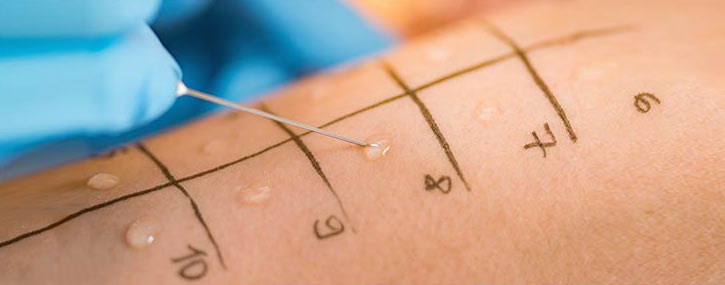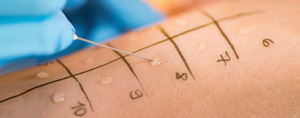Allergy Testing Clinic in Conyers, GA
At The Allergy & Asthma Center, we can help you find out if you have any allergies with our excellent allergy testing services. We are proud to provide allergy testing to patients. For more information, contact us now.


Table of Contents:
What kind of doctor do you see for allergy testing?
What are the 10 most common allergies?
What does an allergist do on their first visit?
While allergies can be a pain in the butt to deal with, it is much better to know of them than to not! If any allergies are found, we can also provide first-rate treatment so that you can live your life relatively unhindered by your allergies.
While primary care physicians and family doctors can provide some allergy testing, the medical doctors who specialize in allergy testing are allergists and immunologists. Allergist immunologists are trained and experienced in evaluating, diagnosing, treating, and managing asthma and various allergies and autoimmune disorders.
With such training and experience, allergist immunologists can provide the following allergy tests:
Blood tests: also known as a radioallergosorbent (RAST) test or ImmunoCAP test, these allergy tests draw a small amount of blood, usually from the patient’s arm, which is analyzed at a laboratory for the presence of anti-allergy antibodies known as immunoglobulin E (IgE).
Challenge tests: involves administering trace amounts of a particular allergen orally or through inhalation to assess for a reaction. Challenge tests are safe when conducted or supervised by an allergist.
Elimination diet and food challenge tests: with this allergy test, the patient is instructed to eliminate a specific food or medication from their diet or intake for a specific amount of time to see if symptoms improve. If there is significant improvement, a challenge test may also be administered.
Intradermal tests: involves introducing a particular allergen beneath the skin to assess for a reaction. These tests are typically conducted when prick or percutaneous tests deliver inconclusive results.
Patch tests: this type of allergy test helps uncover the cause of skin allergies, such as contact dermatitis, by treating patches with various chemicals or skin sensitizers and applying them to the skin. After 24 hours, the skin is checked for a local reaction, and again after another 24 to 48 hours.
Prick tests: also referred to as percutaneous tests, prick tests use a plastic pricking device that contains the allergen to lightly prick the surface of the skin to assess for an allergic reaction, such as swelling or redness. The size of the reaction determines the severity of the allergy.
There are numerous types of allergies, including respiratory allergies, food allergies, skin allergies, and medicinal allergies. Of those different types of allergies, ten of the most common include the following:
– Allergic rhinitis, also referred to as hay fever
– Peanut allergies
– Milk allergies
– Shellfish allergies
– Latex allergies
– Contact dermatitis
– Penicillin allergies
– Animal dander allergies
– Bee or wasp sting allergies
– Soy allergies
In your first visit with an allergist, your allergist will likely review your personal and family medical history, including allergy history, medications you are currently taking, and any underlying medical conditions you have. As such, it may be helpful to compile a list of your medications, medical conditions, and allergies while also bringing along any relevant medical records to your appointment. You may also want to compile a list of questions you have for your allergist to make the most of your appointment.
Depending on what the allergist learns from their review of your medical history and your particular allergy questions and concerns, they may also conduct certain tests to diagnose any allergies. If any allergies are found, they may also provide or recommend treatment, which can come in allergy shots, prescription medications, trigger avoidance, or lifestyle changes to minimize symptoms.
If you require allergy testing, our board-certified allergists at The Allergy & Asthma Center would be happy to help! We welcome you to schedule an appointment with us through our website or call us at one of our three clinics located in Atlanta GA, Conyers GA, and Lawrenceville, GA. We serve patients from Lawrenceville GA, Atlanta GA, Conyers GA, Suwanee GA, Duluth GA, Grayson GA, Decatur GA, Brookhaven GA, Lithonia GA and Covington GA.

Additional Allergy & Asthma Services
▸ Allergy Shots
▸ Allergy Testing
▸ Asthma
▸ Bronchodilators
▸ Drug Allergy
▸ Food Allergy
▸ Insect Allergy
▸ Nasal/Sinus Allergies
▸ Pediatric Allergy
▸ Pediatric Asthma
▸ Skin Allergy
▸ Spring Allergies




